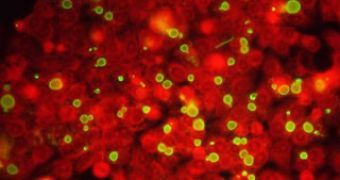Syphilis, HIV or gonorrhea may sound more familiar to you when talking about sexually transmitted diseases.
But the most common sexually transmitted disease in the US is none of the above, but that inflicted by the Chlamydia bacteria, according to Centers for Disease Control and Prevention (CDC).
That's why a research team at The University of Texas at San Antonio's South Texas Center for Emerging Infectious Diseases (STCEID) and The University of Texas at San Antonio Health Science Center are undertaking a common effort to create a vaccine against Chlamydia.
Chlamydia trachomatis can damage a woman's reproductive organs, even if usually the symptoms are mild or absent. Severe complications can provoke irreversible damage, like infertility, before a woman ever recognizes a problem.
In men, the bacteria can cause discharge from the penis, prostatitis, and epydidymitis, which can lead to sterility.
The most recent report from the CDC indicates that 930,000 cases of Chlamydial infection were assessed in the United States in 2004, while gonorhea (the next most spread sexually transmitted disease, also provoked by a bacteria) registered about 360,000 cases.
It's estimated that worldwide, each year another 2.8 million people get infected with Chlamydia.
After a three-year investigation of trial-and-error in mice, Ashlesh Murthy, a post-doctoral student in the UTSA Cell and Molecular Biology program has discovered an effective vaccine against chlamydia.
The next step will be to check the new vaccine in larger mammals, like guinea pigs. "This is a very prevalent disease in women throughout the world and the biggest problem is that most infected women never show any symptoms, so they never get treated," said Murthy. "When Chlamydia is left untreated, it can lead to severe complications including pelvic-inflammatory disease, ectopic pregnancies, and infertility." Plus premature birth, cervicitis, reactive arthritis, urethritis, new born eye and lung infection.
"With the recent success of the human papilloma virus vaccine, developed to prevent cervical cancer in young women, I think the urgency to develop a Chlamydia prevention vaccine is on the horizon," said lead researcher Bernard Arulanandam, an associate professor of biology with a six years experience in the study of Chlamydia.

 14 DAY TRIAL //
14 DAY TRIAL //